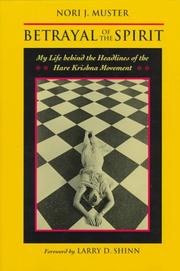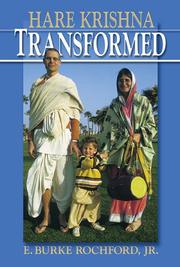| Listing 1 - 4 of 4 |
Sort by
|
Book
ISBN: 0253054893 0253054923 0253054885 0253054907 Year: 2021 Publisher: Bloomington, Indiana : Indiana University Press,
Abstract | Keywords | Export | Availability | Bookmark
 Loading...
Loading...Choose an application
- Reference Manager
- EndNote
- RefWorks (Direct export to RefWorks)
"How do religious groups reinvent themselves in order to attract new audiences? How do they rebrand their messages and recast their rituals in order to make their followers more diverse? In Branding Bhakti, Nicole Karapanagiotis considers the new branding of the Hare Krishna Movement, or the International Society for Krishna Consciousness (ISKCON). Known primarily for their orange robes, shaved heads, ecstatic dancing on the streets, and exuberant Hindu-style temple worship, many contemporary ISKCON groups are radically reinventing their public presentation and their style of worship in order to attract a global audience to their movement. Karapanagiotis explores their innovative and complex approaches in both the United States and India by following three new ISKCON brands aimed at gathering new followers. Each is led by a world-renowned ISKCON guru and his global disciples, and each is promoted through a mix of digital and social media and the construction of an innovative "worship-scape." These new spaces trade ISKCON's traditional temples for corporate work-klife balance programs, posh yoga studios, urban spiritual lounges, edgy mantra clubs/lofts, and rural meditative retreat facilities. Branding Bhakti not only investigates the methods the ISKCON movement uses to position itself for growth but also highlights devotees' painful and complicated struggles as they work to transform their shrinking, sectarian movement into one with global religious appeal"--

ISBN: 0252094999 9780252094996 0252022637 9780252022630 0252065662 9780252065668 1306401585 Year: 1997 Publisher: Urbana
Abstract | Keywords | Export | Availability | Bookmark
 Loading...
Loading...Choose an application
- Reference Manager
- EndNote
- RefWorks (Direct export to RefWorks)
Hare Krishnas --- Hindus --- Biography. --- Muster, Nori J. --- International Society for Krishna Consciousness. --- International Society for Krsna Consciousness --- International Society for Krishna Consciousness --- Internationale gemeenschap voor Krishna-bewustzijn --- ISKCON --- the Krishna's International Society --- guru --- Jonestown --- spirituality --- drugs --- guns --- children --- P.R. Publications --- L.A. --- 1986 --- the ISKCON World Review --- women --- Ramesvara

ISBN: 0814776884 0814769071 1435607392 9781435607392 9780814775783 0814775780 9780814775790 0814775799 9780814769072 9780814776889 Year: 2007 Publisher: New York : New York University Press,
Abstract | Keywords | Export | Availability | Bookmark
 Loading...
Loading...Choose an application
- Reference Manager
- EndNote
- RefWorks (Direct export to RefWorks)
Most widely known for its adherents chanting “Hare Krishna” and distributing religious literature on the streets of American cities, the Hare Krishna movement was founded in New York City in 1965 by A. C. Bhaktivedanta Swami Prabhupada. Formally known as the International Society for Krishna Consciousness, or ISKCON, it is based on the Hindu Vedic scriptures and is a Western outgrowth of a popular yoga tradition which began in the 16th century. In its first generation ISKCON actively deterred marriage and the nuclear family, denigrated women, and viewed the raising of children as a distraction from devotees' spiritual responsibilities. Yet since the death of its founder in 1977, there has been a growing women’s rights movement and also a highly publicized child abuse scandal. Most strikingly, this movement has transformed into one that now embraces the nuclear family and is more accepting of both women and children, steps taken out of necessity to sustain itself as a religious movement into the next generation. At the same time, it is now struggling to contend with the consequences of its recent outreach into the India-born American Hindu community. Based on three decades of in-depth research and participant observation, Hare Krishna Transformed explores dramatic changes in this new religious movement over the course of two generations from its founding.
Hindu converts --- Hinduism --- Families --- Converts --- Hindus --- Religions --- Brahmanism --- Family --- Family life --- Family relationships --- Family structure --- Relationships, Family --- Structure, Family --- Social institutions --- Birth order --- Domestic relations --- Home --- Households --- Kinship --- Marriage --- Matriarchy --- Parenthood --- Patriarchy --- Religious aspects --- International Society for Krishna Consciousness. --- Social aspects --- Social conditions --- Krishna --- Christna --- Gopal --- Kr̥ṣṇa --- Govinda --- Mohan --- Gopala --- Bal Gopal --- Cult --- International Society for Krishna Consciousness --- International Society for Krsna Consciousness --- Internationale gemeenschap voor Krishna-bewustzijn --- History. --- Krishna (Hindu deity) --- Based. --- Hare. --- Krishna. --- Transformed. --- changes. --- course. --- decades. --- dramatic. --- explores. --- founding. --- from. --- generations. --- in-depth. --- movement. --- observation. --- over. --- participant. --- religious. --- research. --- this. --- three. --- Hare krishna --- America --- gender --- family --- culture --- change --- child abuse --- public schooling --- identity --- Hinduization --- world accomodation
Periodical
ISSN: 20419511 2041952X
Abstract | Keywords | Export | Availability | Bookmark
 Loading...
Loading...Choose an application
- Reference Manager
- EndNote
- RefWorks (Direct export to RefWorks)
Periodicals --- Cults --- Religions --- Religion. --- Religiöse Bewegung. --- Alternative religious movements --- Cult --- Cultus --- Marginal religious movements --- New religions --- New religious movements --- NRMs (Religion) --- Religious movements, Alternative --- Religious movements, Marginal --- Religious movements, New --- Cults. --- Religions. --- Comparative religion --- Denominations, Religious --- Religion, Comparative --- Religions, Comparative --- Religious denominations --- World religions --- Pseudoreligion --- Sects --- Civilization --- Gods --- Religion --- Religiöse Bewegung --- new religions --- book reviews --- Human Rights --- Jehovah's Witnesses --- prophecy --- islam --- Australia --- Australian aborigines --- ufology --- UFOs --- UFO Religions --- heathenism --- traditionalism --- Left-Hand Path (LHP) --- satanism --- religious pluralism --- misconceptions --- religious diversity --- discrimination --- methodology --- new religious movements (NRM) --- minority religions --- Watch Tower --- eschatology --- Watch Tower Society --- biblical chronology --- failed predictions --- Religious Studies --- Sociology --- muslims --- conversion --- Aboriginal Muslims --- Australian Aboriginies --- marginalisation --- Aliens --- extraterrestrials --- myths --- Sweden --- Swedish UFO movement --- Erland Sandqvist --- Gösta Rehn --- Radical Taditionalism --- esotericism --- The Rune-Gild --- paganism --- runes --- surveys --- questionnaires --- alternative religions --- neopaganism --- neo-paganism --- identity construction --- Catholicism --- Monastic Organizations --- Zen Buddhism --- Japanese Zen --- Japanese Buddhist Schools --- Ningen Zen Kyodan (人間禅教団) --- laypeople --- Ningen Zen --- japanese religions --- koji Zen --- Ayurveda --- Omega Man (1971) --- counter-cult movement --- Richard Matheson --- cult wars --- films --- movies --- Ayurvedic health counselling (Sweden) --- holistic medicine --- spirituality health care --- positioning --- coaching --- alternative medicines --- Religious organizations --- Monastic Communities --- children --- children in new religious movements --- children and cults --- sects --- Candice O'Denver --- postmodernity --- awareness --- Great Freedom group --- David Lyon --- Kenneth Gergen --- Anthony Giddens --- self-improvement --- Japan --- Mormonism --- apocalypse --- millennialism --- Aum Shinrikyo (オウム真理教) --- Shoko Asahara (麻原彰晃) --- Kofuku no Kagaku (幸福の科学) --- Japanese new religious movements --- church-sect dichotomy versus esoteric interpretation --- symbolism --- magic and masonry --- Book of Mormon --- Book of Abraham --- Latter-day Saints --- mormons --- Joseph Smith Jr. --- Theosophy --- messianism --- Slavdom --- White Brotherhood --- Bulgaria --- national identity --- Bogomils --- New Atheism --- Enlightenment --- Irreligion --- Secularity --- Healing Churches --- religious therapy --- spiritual healing --- discordianism --- Chaos magic --- fiction-based religions --- Hugh B. Urban --- Principia Discordia (1965) --- Illuminatus! Trilogy (1975) --- Thee Temple ov Psychick Youth (TOPY) --- parody religions --- shinshūkyō (新宗教) --- Happy Science (幸福の科学, Kōfuku-no-Kagaku) --- The Family International (TFI) --- Organizational Change --- David Berg --- the Reboot --- New Zealand --- Census --- Religious Denominations --- affiliation --- disafilliation --- apostasy --- Church of Scientology --- sociology of religion --- ex-cult members --- Landmark Education --- the Landmark Forum --- corporate religion --- Werner Erhard --- Transcendental Meditation (TM) --- Sri Sri Ravi Shankar --- Sudarshan Kriya --- legitimization --- religious entrepreneurship --- Art of Living movement --- Glastonbury --- Frederick Bligh Bond --- historiography of religion --- Glastonbury Abbey --- New Age --- Modern Satanism --- dialogue --- the Unification Church --- Korea --- Won Buddhism --- new religion --- self-differentiation --- inter-religious dialogue --- the Pope --- anti-Catholic dialogue --- the 'symbolic construction' of identity --- fundamentalisms --- the symbolic origins of Rastafari --- Hare Krishna --- popular culture --- theology --- Ireland's New Religious Movements --- the fundamentalist Latter Day Saints --- Texas --- raid --- the International Raelian movement --- new religious movements --- mainstream religions --- the State --- secular Estonia --- Unification Church (UC) --- Sun Myung Moon --- World Council of Churches (WCC) --- Kingdom of Heaven --- Troeltsch --- Second Coming --- salvation --- Lord of the Second Advent --- Divine Principle --- Universal Peace Federation (UPF) --- World Peace --- ecumenism --- interfaith --- global ethic --- Sot’aesan --- Ilwŏnsang --- Chŏngsan --- Ethics of Triple Identity --- homophobia --- pedophilia --- Claude Vorilhon --- Church-state relations --- religion and law --- neoliberalism --- Social Networks --- International Society for Krishna Consciousness (ISKCON) --- Hare Krishna movement --- Longitudinal Approaches --- Exclusive Brethren --- media --- newspapers --- controversy --- politics --- content analysis --- church - state issues --- media transformation --- anticult movement (ACM) --- former members --- brainwashing --- Halal --- Kosher --- food --- Food and Religion --- taboo --- fundamentalism --- authenticity --- purity --- glatt --- spiritual therapies --- gender --- gender discrimination --- Jehovah’s witnesses (Sweden) --- Reiki --- conspiracism --- David Icke --- theodicy --- Reptilian Thesis --- New Age Theodicy --- teenagers --- One-World View --- Two-World View --- George Gurdjieff (1866–1949) --- Peter D. Ouspensky --- Pyotr Demianovich Ouspenskii (Пётр Демьянович Успенский) --- spirituality --- religious groups --- atheism --- personal autonomy --- sacredness --- complementary medicine --- alternative medicine --- professionalization --- self-regulation --- Swedish Reiki organizations --- Beelzebub --- Satanism studies --- boundary-work --- research methods --- feminism --- Anton Szandor LaVey (1930 - 1997) --- sex magic --- occultism --- witchcraft --- feminine fluids --- bodily secretions --- Aleister Crowley --- women --- Essentialism --- Constructionism --- Femininity --- female leadership --- Gnosticism --- heavy metal music --- Latin American Folk Religion --- Contemporary Legends --- anti-cosmic Satanism --- heavy metal --- Nordic black metal music --- Order of Nine Angles (ONA or O9A) --- traditional Satanism --- progressive Left-Hand Path --- Sinister milieu
| Listing 1 - 4 of 4 |
Sort by
|

 Search
Search Feedback
Feedback About UniCat
About UniCat  Help
Help News
News